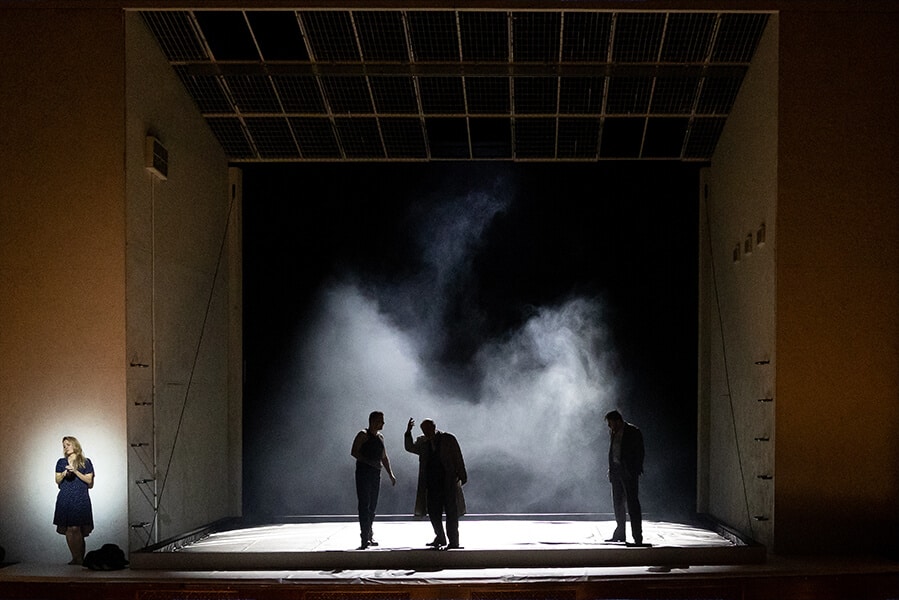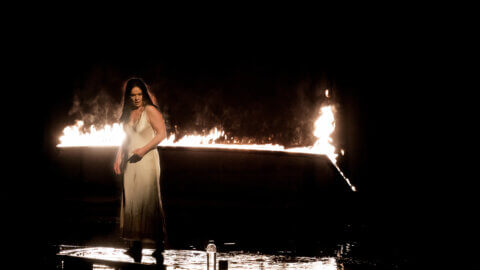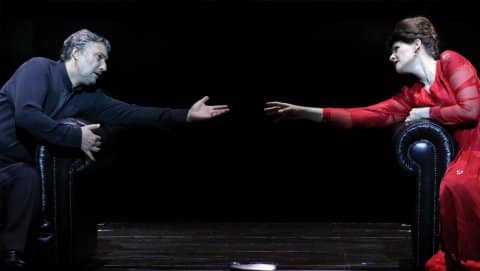KATYA KABANOVA – PRAGUE NATIONAL THEATRE
★★★★★☆

Foto: Zdeněk Sokol
REVIEW KATYA KABANOVA: VIOLENT VOLGA
Love destroys everything. Lack of love destroys the rest. Bold Spanish director Calixto Bieito has stripped Janacek’s operatic drama of Katya Kabanova down to its sock-holders in this daring new production on the composer’s home turf in Prague.
With an icy and crushing staging, the tragedy of the completely dysfunctional Kabanova family is exposed in all its naked humiliation.
A phenomenally well-played orchestra in the National Theatre’s excellent acoustics establishes just how disturbingly beautiful Janacek’s music can be. Violent, insistent soundscapes accentuate the characters’ path to inner disintegration and fall. Magnificent.
The story is sad from end to end. In a white stage space without a single set piece, we find Katja huddled in a corner or crawling around the walls trying to escape her devious, imprisoned village life and unhappy marriage.
It starts even as the audience is settling in, only slowly realizing that something is afoot – and lasts right up until husband Tichon comes home drunk (as usual) and beats her up (as usual).
Tichon, for his part, doesn’t have it easy either, with his bitter, spiteful mother Kabanicha living in the house, who does nothing but complain about him in particular, and ruin the family’s life in general. Everyone is costumed up-to-date, smart casual, which in a weird way draws references to other, dysfunctional family portraits that one roams in various editions of Desperate Housewives.
The only bright spot seems to be foster daughter Varvara, who is like a sister to Katja but ends up doing her the disservice that costs her her life. It’s going pretty damn well, don’t you think?
Janacek wrote Katja in the late 1920s after seeing Puccini’s then rather new Madame Butterfly several times, and was clearly inspired by this tragic female character who meets her doom in her perhaps naive but in every way good-hearted and innocent search for love.
Tichon, always with the unpredictable ghost of alcohol in his eyes, for which his mother does not fail to constantly mock him – is going on a journey. Katja now manages to sneak out and explore her secret, budding love for one of the local bachelors.
Both know it will lead to ruin. Predictably, that doesn’t stop them from acting out their urges, and already here on the first date (phew!), having standing sex up the back wall. Things just got a little quiet in Prague.
Everything comes to an end, of course, and when Katja’s chosen one has to go to Siberia on a long business trip soon after, all hope of a new life in security, love and freedom seems gone.
Katya fills her coat with stones and throws herself into the Volga, the river on whose imaginary banks the action has taken place. Tichon fishes out her wet corpse in the final scene and must have saved himself a hefty moral hangover.
Something of a wow experience is had about halfway through the only 1.5 hour/short and pauselos performance, when the bare back wall collapses and transforms into a gigantic vat, slowly filling with enough water to ensure Katya’s believable drowning death in the play’s poignant finale.
I was pretty excited about the performance myself, genuinely captivated by the intense music, the competent singers and above all the outstanding, painterly orchestral playing under the direction of Jaroslav Kyzlink.
The Czech critics, however, have been more reserved, calling the director thoroughly overrated, and incidentally taking exception to the fact that the soloists do not articulate the Czech language as befits this particular stage.
In this critical context, I must of course pass – and instead rejoice in the great opera experience I brought home from the Katja 2022 premiere in Prague’s imposing National Theatre with a large audience in gala attire.
That’s how we like it.

STAR WITHOUT A BRAIN
Normally I don’t like perfidious reviews. In this case I will make an exception.
I simply don’t understand how La Degustation Bohême Bourgeoise in Prague managed to get a Michelin star.
The restaurant is semi-smartly decorated with an okay blingy wine rack-designer arrangement at one end and an open kitchen at the other with copper pots on the wall and such. Here, 4-5 chefs flock to make nothing but accidents.
The menu consists of 5 courses and costs a touch under 700 Danish kroner with a wine pairing for just 500 bucks on top. We may be in Eastern Europe, but still. Perhaps the alarm bell was already ringing there. I didn’t hear it.
The first course was two small appetizers. First, a bit of Tatar between two slices of crispy crunch. Then a small bite of duck stomach – did he really say that? – rolled in a sort of nut caramel and put on a stick. Boom.
It seemed inventive in a way, and promising at best, but it quickly passed when the first actual dish arrived on the table.
Baked beetroot with a splash of splotchy frozen partially thawed goat’s milk and kefir, looked like a traffic accident that would have had Lyngbyvejen blocked off in both directions. The taste was actually quite good, but I missed an adult in the kitchen who could point out the glaringly unappetizing nature of this crappy dish.
The next course was the best of the evening. A small piece of scared, steamed catfish had hidden under a lid of paper-thinly sliced Chinese radish on a bed of clam foam, dulled with bright green parsley oil around the edges. It was ok tasting and actually pretty, but also rather banal and had no more to do with Michelin than the tires on the taxi that took me away from here.
Now for the bird. Lightly cooked meat from chicken thighs was peeled, layered and pressed into terrine.
To make sure the chicken was completely dead, the terrine was sliced a la a piece of sand cake, which was then subjected to efficient, Eastern European breading. That is, hard and brutal, with an properly thick layer of breadcrumbs in bad oil.
The cooking made the pink layers of meat stand out lengthwise and made the serving look like something you’d otherwise associate with Eastern European Red Light District. I had a hard time keeping my mask on as the waiter poured a perfectly innocent but ok Czech Chardonnay into my glass.
A slice of beef tenderloin with some pickled mustard seeds was exactly as ordinary as it sounds. So was the dessert, a caramel cream with chocolate drizzle that spilled out and ran together in an ugly, beige-brown motif that looked like something from the GDR before the Wall fell.
Star without a brain must be the right headline for this review of Degustation, a restaurant that pops up on every site about good food and good restaurants in Prague. There’s a lot you don’t understand.




